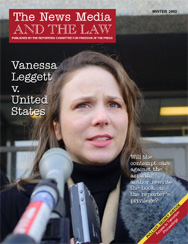October 16, 2011
Should reporters serve jail time for not revealing sources to the government?
Posted by Sarah Bailey under 9, Discussions | Tags: Leggett v. U.S. (2002), Reporter's Privilege, Shield Laws |No Comments
A hypothetical situation
Imagine spending almost six months in jail away from family, friends and loved ones, as punishment for reporting and refusing to give your information to the government. Now see this as a choice, something that you intentionally decide to do in order to uphold a specific right of people all over the nation. You are the source that the government needs to solve a murder case. Instantly, you find yourself becoming part of your work instead of observing it. Instead of advancing as a journalist, you must face the decision of handing over your notes or spending time in the slammer. Quickly, the choice becomes a reflection of not only your character, but also your values and commitment to people all over the nation.
The Legal Background
For a writer named Vanessa Leggett, this situation became a reality. In the case Leggett v. U.S., Leggett, an aspiring “true crime” writer, was held in civil contempt as a non-complying witness. Leggett had collected notes and information concerning the murder case of Doris Angleton of Houston by her husband Robert and his brother Roger. Leggett wanted to write about the situation, so she did interviews of the people involved for her own use. The government decided they wanted the information she obtained, because they hoped it would give them enough information to solve the murder mystery. When she refused to give up her notes, she was put in jail for six months. She was sent to jail on July 19, 2001 and was not let out until January 4, 2002, when the grand jury’s investigation of the Angleton family had ended without any indictments.
This case has brought up many questions by journalists and groups such as the Reporters Committee for Freedom of the Press. Should journalists be provided shield laws, or laws which protect journalists from revealing their sources? While there are shield laws in certain states, not every state is required to have them. By many, this case is seen as a step backwards for reporters’ privileges and could be seen as a situation that would cause a chilling effect. Also, the court did not investigate the actions of the U.S. Department of Justice, or weigh the First Amendment rights against the government’s want for Leggett’s work.
- If you were on the jury for Leggett’s case, what would you say?
- What would you do if you were reporting and the government asked you for your notes? Would you face jail time to protect your sources?
- What are some arguments in support of the government obtaining journalists’ notes?
